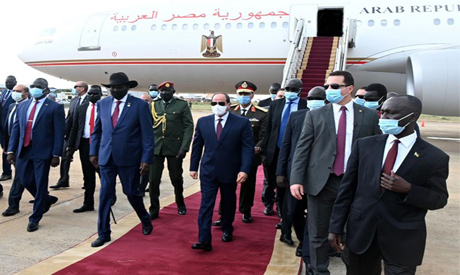
President Abdel-Fattah Al-Sisi visits South Sudan
This week’s visit by President Abdel-Fattah Al-Sisi to Juba may not have produced an agreement between the two countries on military and security cooperation but, in the assessment of Cairo, it succeeded in opening the door to significant advances in such cooperation.
“This was a very important visit. It was undertaken with the intention of sending a message, not just to the authorities in South Sudan, but also to the South Sudanese public and neighbouring African states, that Egypt is committed at the highest levels to promoting closer cooperation with its African neighbours,” said an Egyptian official.
Cairo, he added, will be reaching out to more countries in East Africa to consolidate ties. In Tanzania, it is already helping with the construction of the Julius Nyerere Dam and hydropower station, and last week Egypt conducted its first ever joint military drills with Sudan.
“For us, East Africa has always been an obvious zone of interest, and recently we have been working to upscale our cooperation there,” said the official.
There is a long list of challenges ahead that Cairo knows it will have to work on in order to consolidate its position in East Africa. They include the seemingly endless negotiations with Ethiopia and Sudan over the Grand Ethiopian Renaissance Dam (GERD) which Addis Ababa is building over the Blue Nile and that Cairo worries will deplete Egypt’s already insufficient supply of fresh water.
No agreement was reached ahead of Ethiopia’s first filling of the reservoir during this year’s rainy season, and it looks unlikely that one is in reach before next July when Ethiopia has said it will commence a second, for more extensive filling.
Egyptian officials say a much stronger Egyptian presence in East Africa, especially in the form of strategic cooperation, is necessary to secure the backing of Nile Basin states for Egypt’s demand that the filling and operation of GERD respects the basic water interests of Egypt.
GERD has been high on the agenda of discussions that Egyptian officials have had with their East African counterparts, including the foreign minister of Eritrea who was in Egypt last month, and the senior South Sudanese officials whom Al-Sisi met earlier this week.
While Egyptian officials have declined to provide any details on the kind of support they have been receiving from the Nile Basin, they say things are moving in the right direction.
According to Cairo-based foreign diplomats who monitor developments in East Africa, Ethiopia is keeping a very close eye on the inroads Egypt is making.
This week Ethiopia denied reports that it had expelled South Sudan’s ambassador following Al-Sisi’s visit to Juba. Earlier this year Juba had to publicly assure Addis Ababa that it had not granted Egypt a military base in South Sudan.
“Clearly, Ethiopia feels that Egypt is trying to surround it from every possible side,” said one foreign diplomat. “And the statements made by [outgoing US President Donald] Trump speculating on a possible attack by Egypt to blow up the dam have fuelled concerns in Addis Ababa.”
Ethiopian Prime Minister Abiy Ahmed is also very “worried”, say diplomats, about the kind of support that Egypt may extend to the rebel Tigray People’s Liberation Front (TPLF) that is involved in a military confrontation with the federal Ethiopian government. Ethiopian diplomats have already claimed to their European counterparts that Cairo has been trying to use Eritrea, which borders Ethiopia’s Tigray region, to send supplies to the TPLF.
Egyptian officials refuse to credit such allegations with even an off-record comment. They say simply that while GERD is a top concern, it is not the only one Cairo has in East Africa.
Cairo is growing increasingly worried about the expanding non-African military presence in the region, which includes the strategic Red Sea zone. In addition to an established American military presence, Turkey and the UAE are angling to consolidate positions, as is Russia in Sudan.
Cairo is also focused on the growing presence of Israel. Despite more than 40 years of peaceful relations with Israel and what Egyptian officials acknowledge as “intense” security and intelligence cooperation in the offensive against militants in Sinai and elsewhere in the Eastern Mediterranean, Cairo is apprehensive about what the growing Israeli presence on the east of the continent might mean for Egyptian interests.
Egyptian officials say Israel is already involved in huge agricultural schemes in Ethiopia and it is unclear what impact these schemes will have on Addis Ababa’s plans for the GERD reservoir.
This week President Al-Sisi ratified Egypt’s membership of the Red Sea Forum, a Jeddah-based eight-member grouping that also includes Saudi Arabia, Jordan, Yemen, Sudan, Eritrea, Somalia and Djibouti. Though Egypt’s apprehensions about the exact mandate and mode of operation of the forum have yet to be dispelled, Cairo hopes the alliance will act as a bulwark against “aggressive” foreign schemes in the region. And by foreign, Egyptian officials say, they mean any country that is not geographically part of the region.
“What we are witnessing,” says Ayman Abdel-Wahab, a senior commentator at Al-Ahram Centre for Political and Strategic Studies, “is naked jockeying for power in the strategic East Africa/Red Sea zone” and Egypt cannot afford to be the one regional player left out in the cold.
“I think the visit to South Sudan, the military exercises with Sudan, and the ratification of the Red Sea Forum association are all significant,” he says. “They send a clear message that Egypt intends to fully engage in East Africa and around the Red Sea.”
Abdel-Wahab argues that such engagement must cover many areas, with development as important as military and security cooperation.
“China has already expanded its development presence across Africa, including in the east of the continent, and there are more than 200 multinational companies working there, so already there is a lot competition.”
*A version of this article appears in print in the 3 December, 2020 edition of Al-Ahram Weekly
Short link: